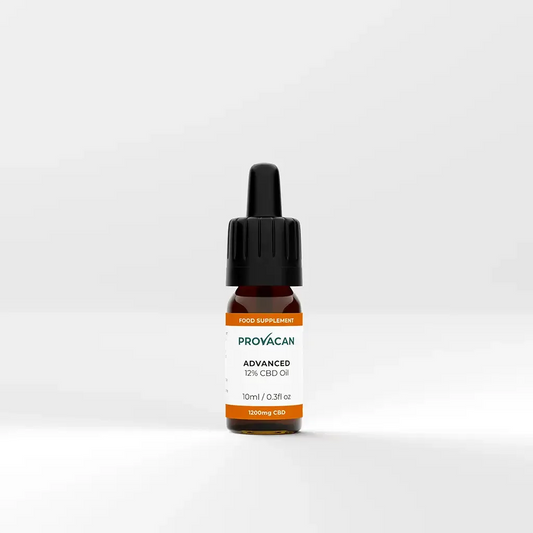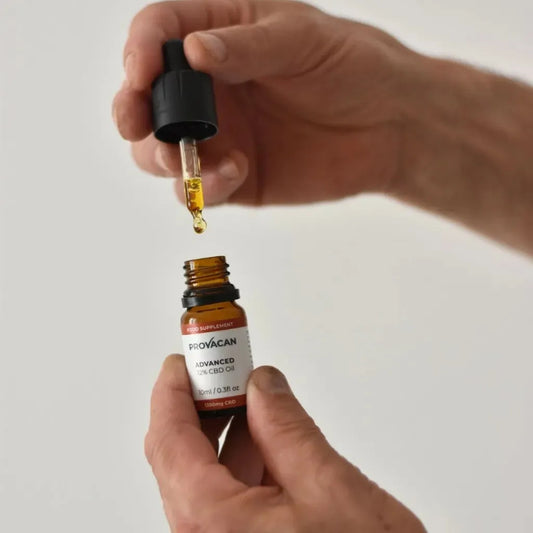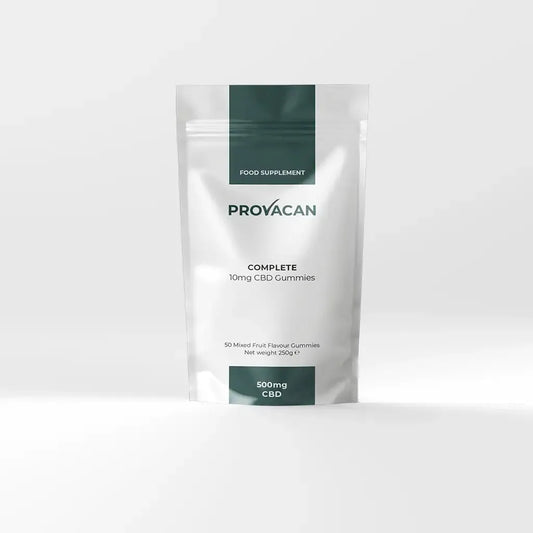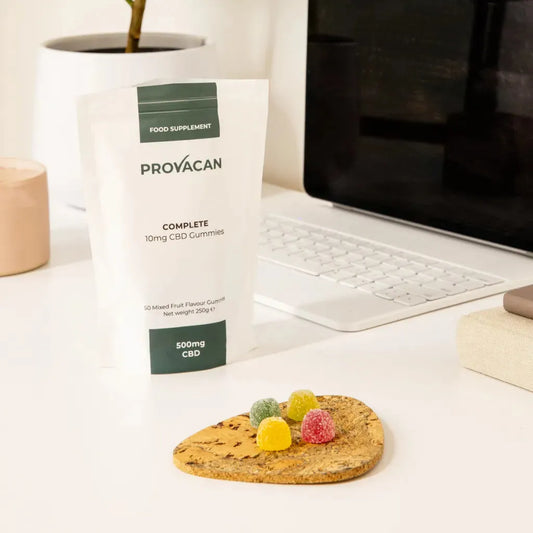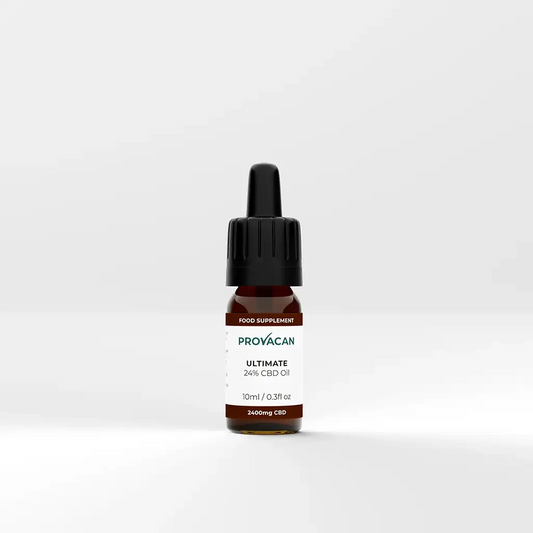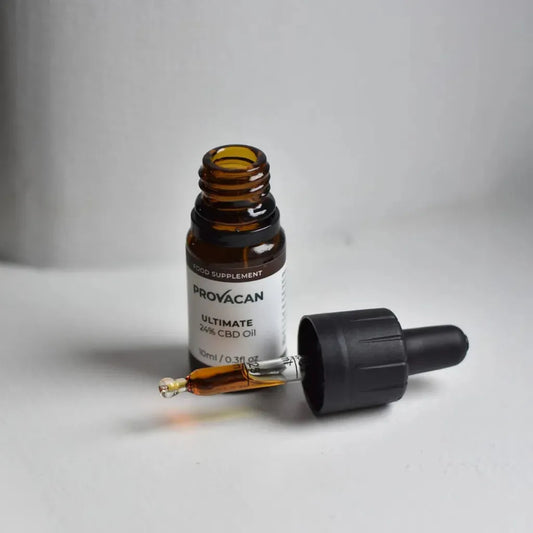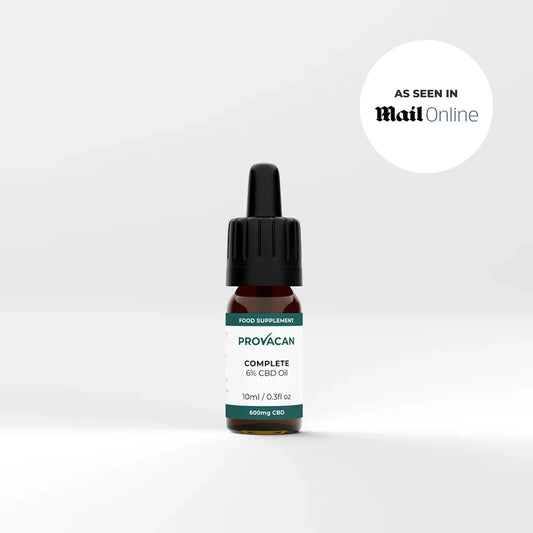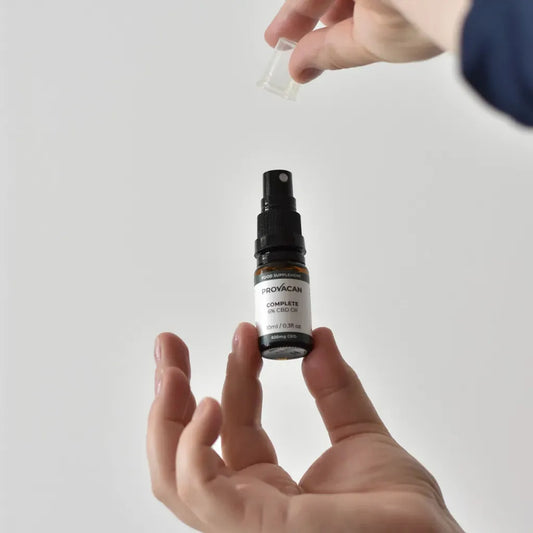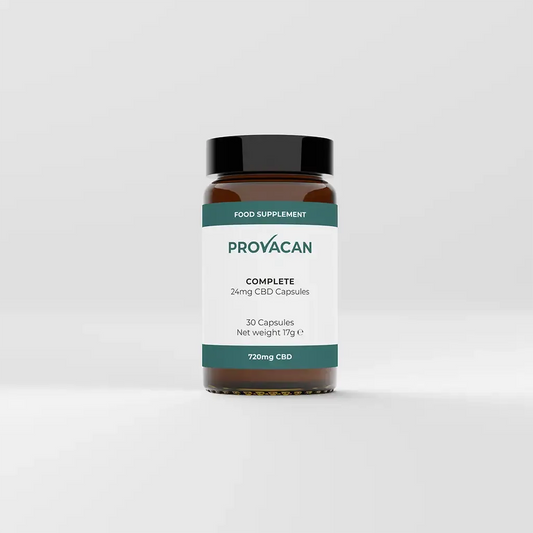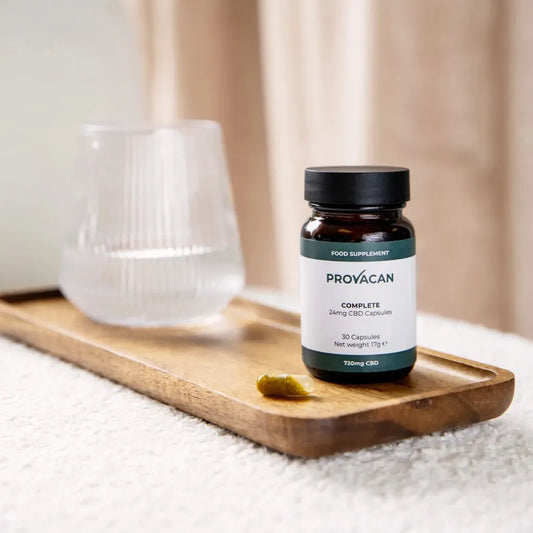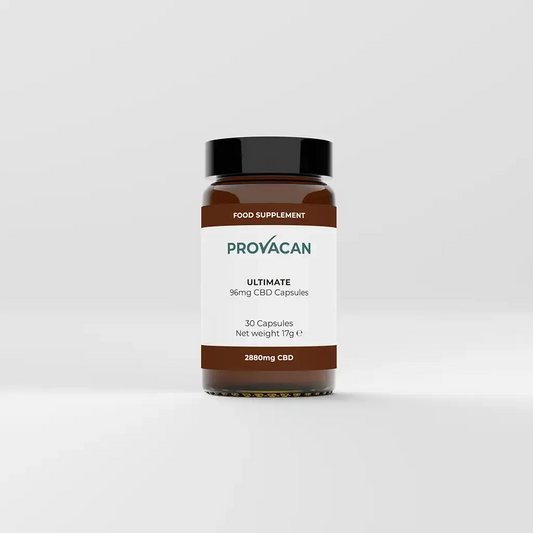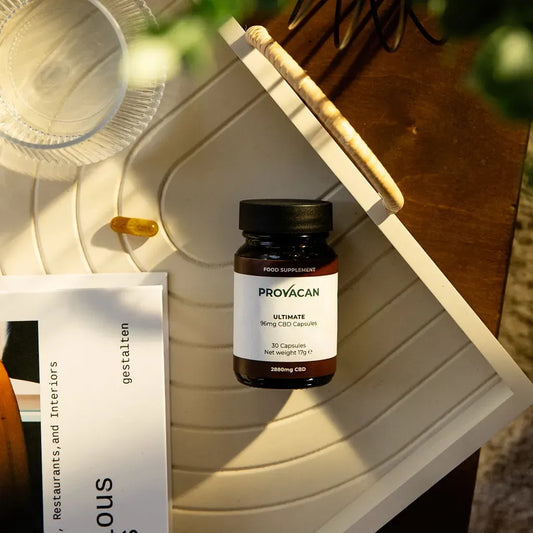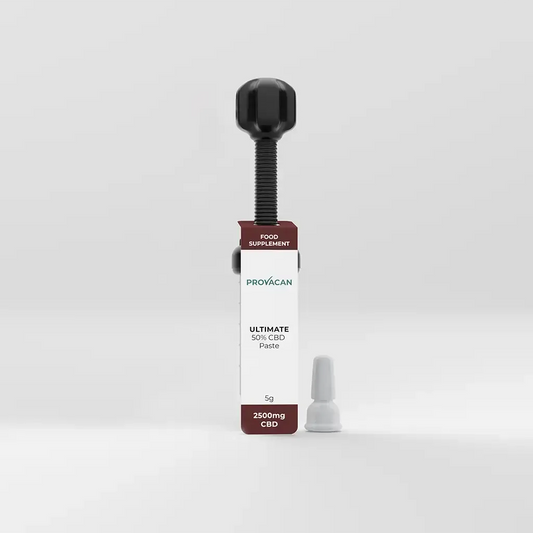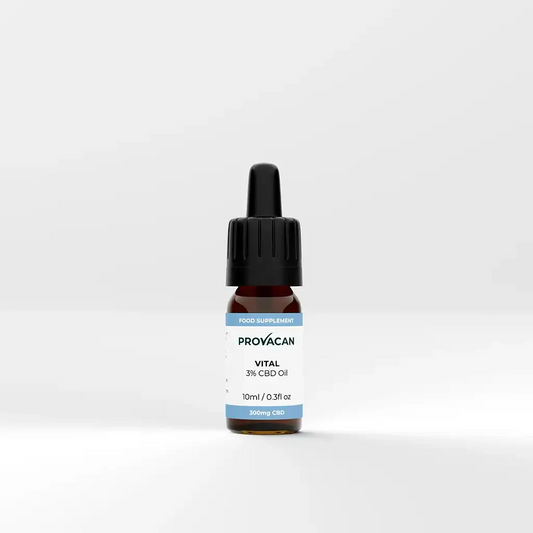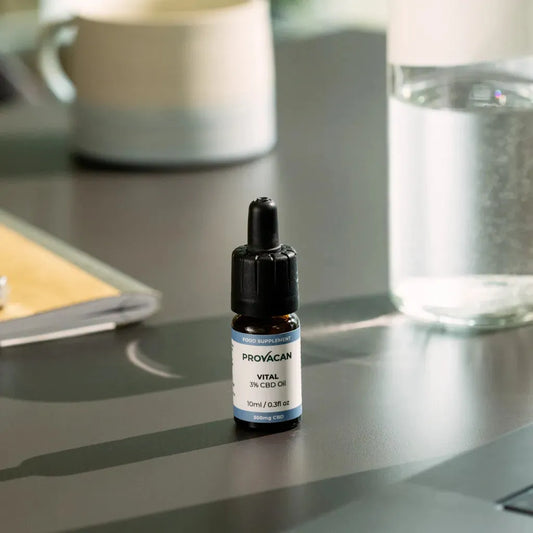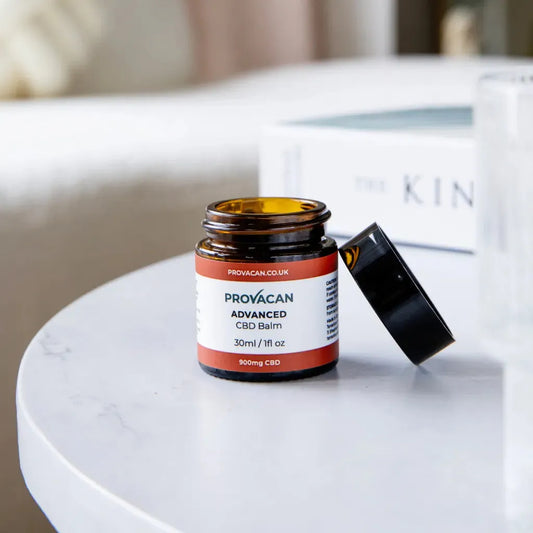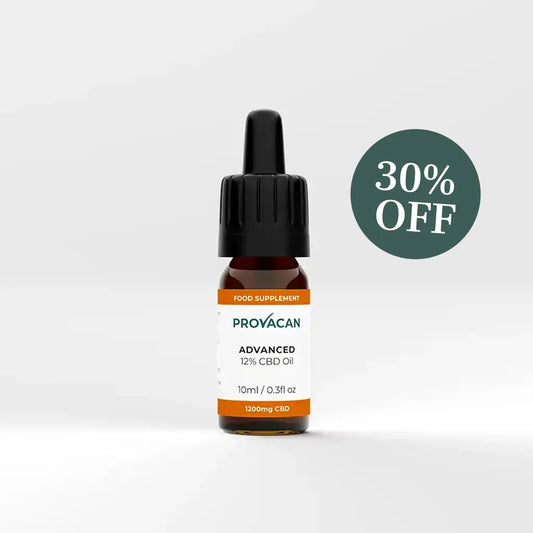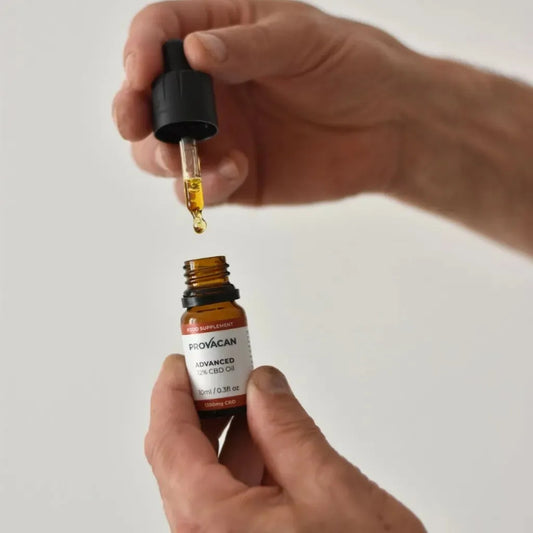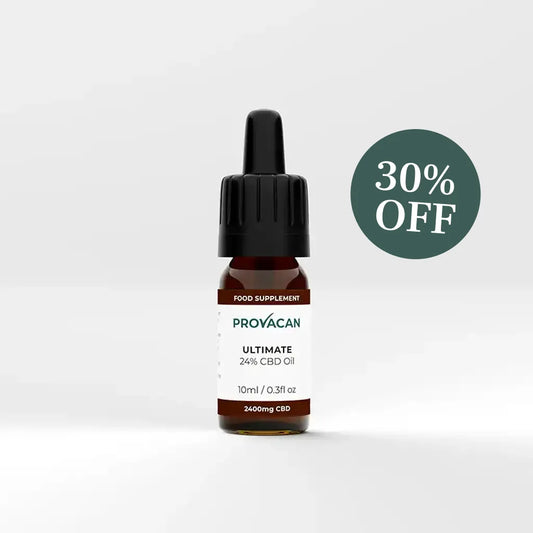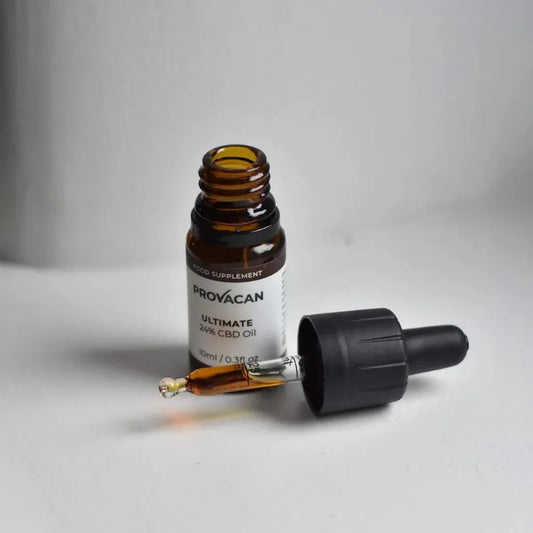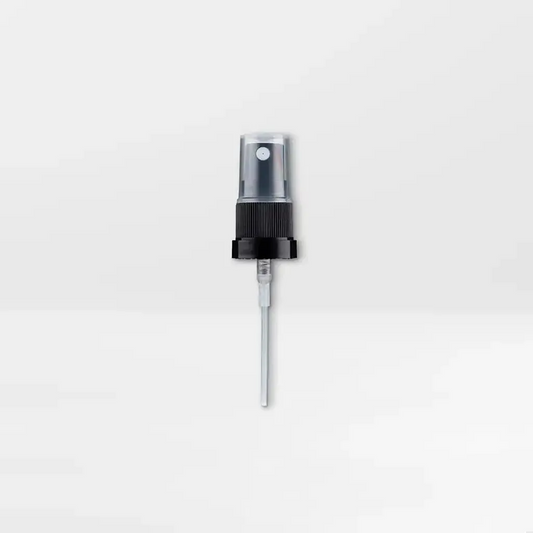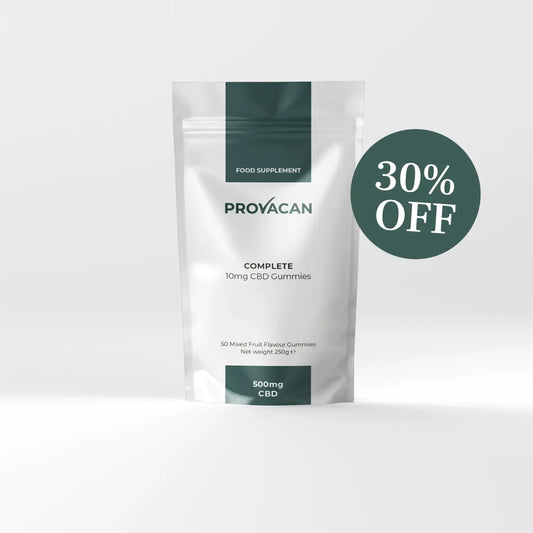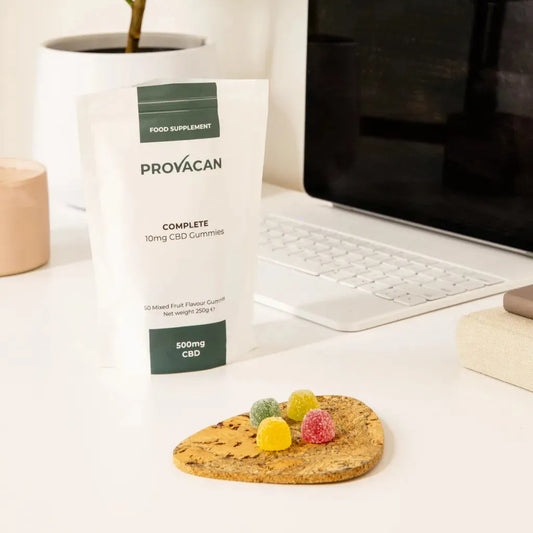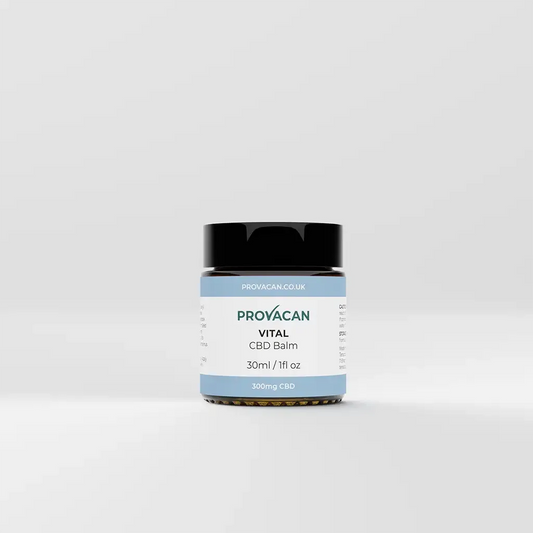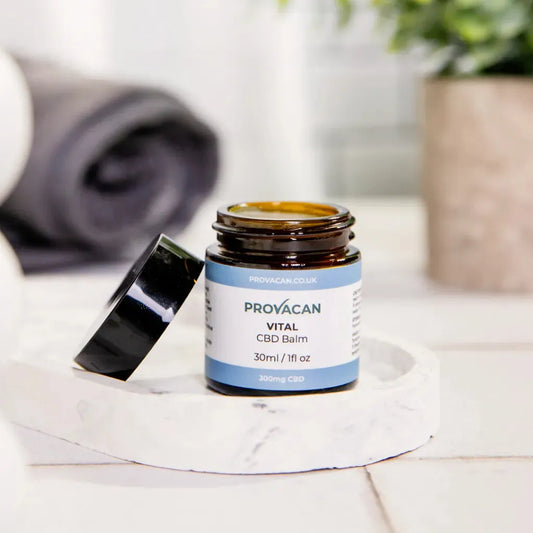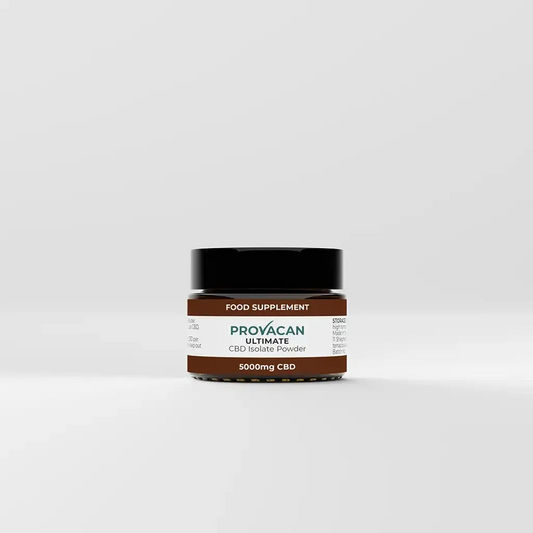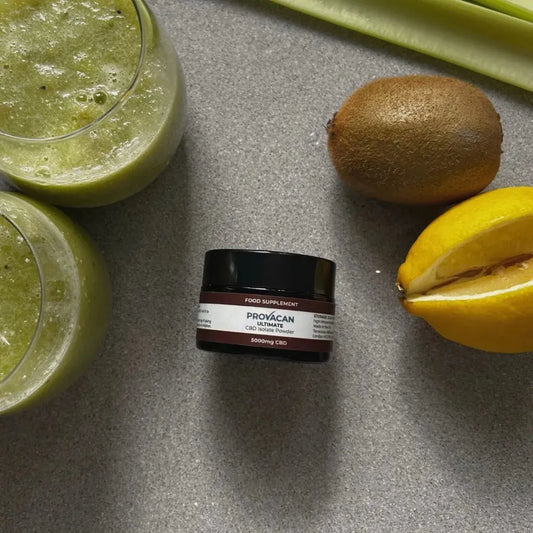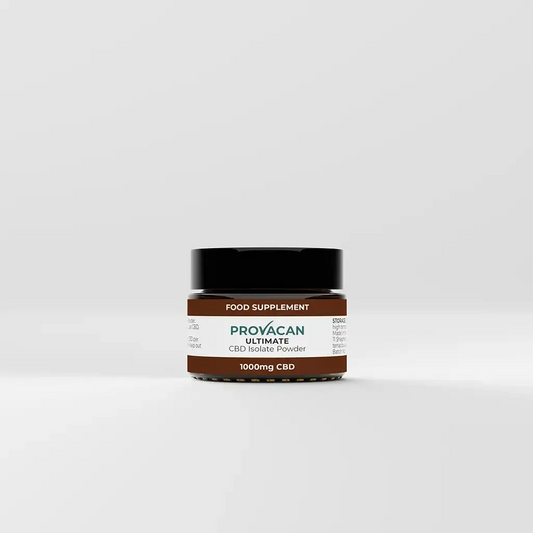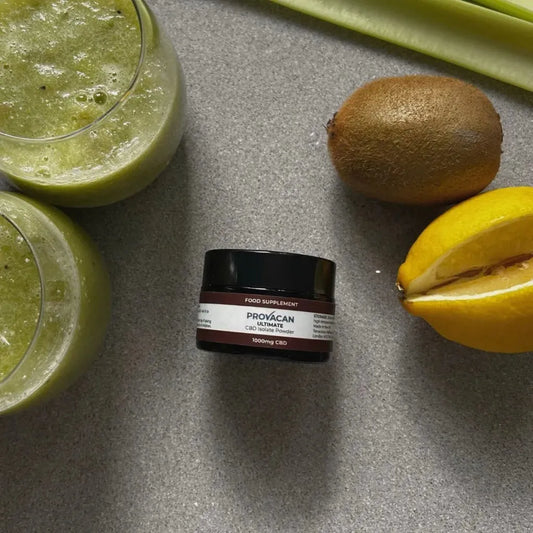Collection: CBD for Stress
Feeling overwhelmed by the demands of daily life or struggling to navigate anxiety-inducing situations? You're not alone. In today's fast-paced world, stress has become an all too familiar companion for many. The good news is that there may be a natural solution to help you find balance and calm in the midst of life's challenges: CBD.
That's why we're here to explore how CBD, a compound derived from the hemp plant, could potentially offer relief for those experiencing stress-related symptoms. Backed by both anecdotal evidence and scientific research, CBD has been gaining recognition for its potential therapeutic benefits, especially in the realm of mental well-being.
-
Book your free consultation
Get expert guidance on natural ways to support sleep, stress, and more.
BOOK NOW
-
Provacan Advanced CBD Oil | 1200mg / 12% CBD, 10ml
4.7 / 5.0
(215) 215 total reviews
Regular price £49.99Regular priceUnit price / per -
Provacan Complete CBD Gummies 50 Pack | 10mg CBD per gummy
4.7 / 5.0
(191) 191 total reviews
Regular price £22.99Regular priceUnit price / per -
Provacan Ultimate CBD Oil | 2400mg / 24% CBD, 10ml
4.7 / 5.0
(165) 165 total reviews
Regular price £79.99Regular priceUnit price / per -
Provacan Complete CBD Oil | 600mg / 6% CBD, 10ml
4.7 / 5.0
(197) 197 total reviews
Regular price £34.99Regular priceUnit price / per -
Provacan Complete CBD Capsules | 24mg CBD per capsule, 30 Pack
4.6 / 5.0
(168) 168 total reviews
Regular price £34.99Regular priceUnit price / per -
Provacan Ultimate CBD Capsules | 96mg CBD per capsule, 30 Pack
4.6 / 5.0
(70) 70 total reviews
Regular price £89.99Regular priceUnit price / per -
Provacan Ultimate CBD Oil Paste | 2500mg / 50% CBD, 5g
4.7 / 5.0
(267) 267 total reviews
Regular price £89.99Regular priceUnit price / per -
Provacan Vital CBD Oil | 300mg / 3% CBD, 10ml
4.6 / 5.0
(124) 124 total reviews
Regular price £24.99Regular priceUnit price / per -
Provacan Advanced CBD Balm | 900mg / 3% CBD, 30ml
4.6 / 5.0
(70) 70 total reviews
Regular price £39.99Regular priceUnit price / per -
Provacan Advanced CBD Oil | 1200mg / 12% CBD, 10ml - 3 Months Subscription
5.0 / 5.0
(3) 3 total reviews
Regular price £104.97Regular priceUnit price / per£149.97Sale price £104.97Sale -
Provacan Ultimate CBD Oil | 2400mg / 24% CBD, 10ml - 3 Months Subscription
4.5 / 5.0
(6) 6 total reviews
Regular price £167.97Regular priceUnit price / per£239.97Sale price £167.97Sale -
Spray Nozzle for CBD Oil
3.5 / 5.0
(8) 8 total reviews
Regular price £1.99Regular priceUnit price / per -
Provacan Complete CBD Gummies 50 Pack | 10mg CBD - 3 Months Subscription
5.0 / 5.0
(1) 1 total reviews
Regular price £48.27Regular priceUnit price / per£68.97Sale price £48.27Sale -
Provacan Vital CBD Balm 300mg CBD / 1% CBD, 30ml
4.5 / 5.0
(4) 4 total reviews
Regular price £22.99Regular priceUnit price / per -
Provacan Ultimate CBD Isolate | 5000mg / 5g CBD
4.6 / 5.0
(66) 66 total reviews
Regular price £44.99Regular priceUnit price / per -
Provacan Ultimate CBD Isolate | 1000mg / 1g CBD
4.6 / 5.0
(65) 65 total reviews
Regular price £22.99Regular priceUnit price / per
Dosage Recommendations for Stress Management
When it comes to using CBD for stress relief, finding the right dosage is key to experiencing its benefits effectively. Dosage recommendations can vary based on individual factors such as body weight, metabolism, and the severity of stress symptoms. It's important to start with a low dosage and gradually increase until the desired effects are achieved.
For general stress relief, a daily dosage of 15-25mg of CBD is often recommended. This can be adjusted based on the individual's response to the initial dosage. Some people may find relief with lower doses, while others may require higher amounts for optimal results.
If you are dealing with more severe or chronic stress, a higher dosage of 30-50mg per day may be more beneficial. Again, it's essential to start with a lower dosage and increase gradually to assess how your body responds.
Factors such as the type of CBD product, its concentration, and method of consumption can also impact dosage recommendations. For example, CBD oils and tinctures allow for easy dosage adjustments by increasing or decreasing the number of drops taken.
It's important to consult with a healthcare professional before starting a CBD regimen, especially if you are taking other medications. They can provide personalized recommendations based on your individual needs and help monitor your progress.
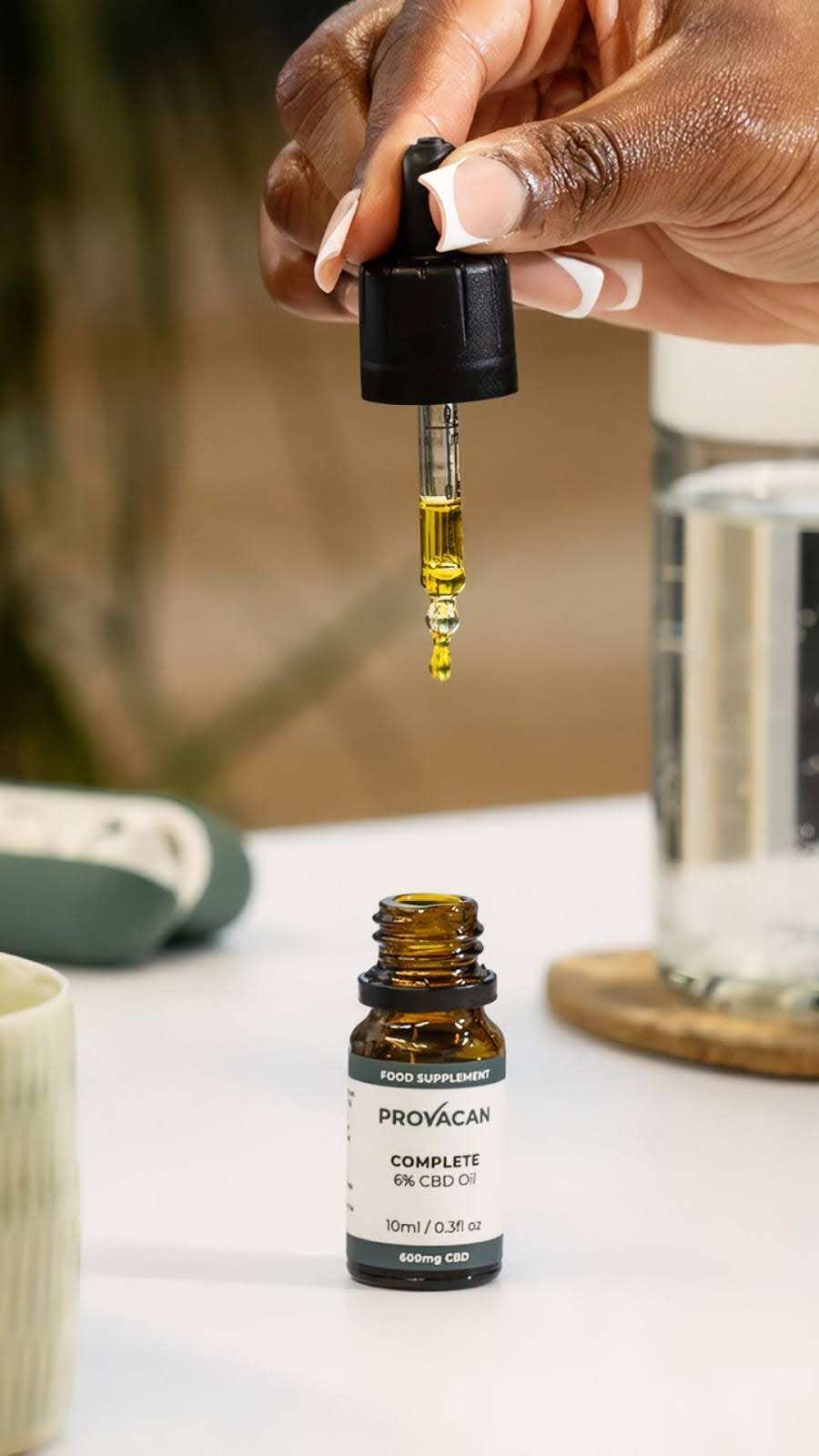
Creating a Balanced Approach to Stress Management with CBD
CBD, short for cannabidiol, is a natural compound found in cannabis plants. Unlike its counterpart THC, CBD is non-psychoactive, meaning it does not induce a "high" feeling commonly associated with cannabis use.
When it comes to stress management, incorporating CBD into your routine can offer a holistic approach to finding balance. Research suggests that CBD may interact with the body's endocannabinoid system, which plays a crucial role in regulating various physiological processes, including stress response.
One of the ways CBD may help manage stress is by promoting relaxation. By interacting with receptors in the brain that are linked to anxiety and stress, CBD may potentially help calm the mind and promote a sense of well-being.
Furthermore, CBD has been studied for its potential to support healthy sleep patterns. Quality sleep is essential for overall well-being and plays a significant role in stress management. CBD may help improve sleep quality by addressing factors that disrupt sleep, such as anxiety or discomfort.
It's important to note that while CBD shows promise in stress management, individual experiences may vary. Consulting with a healthcare professional before incorporating CBD into your wellness routine is advised, especially if you have underlying health conditions or are taking medications that may interact with CBD.
How CBD Interacts with the Body to Reduce Stress
CBD, or cannabidiol, is renowned for its potential to manage stress and anxiety through its interaction with the body's endocannabinoid system (ECS). The ECS, integral in maintaining bodily homeostasis, responds to CBD by modulating neurotransmitter function and regulating stress response. This involves CBD's action on CB1 and CB2 receptors, which are key in reducing inflammation and balancing stress hormone levels, further aiding in stress alleviation.
Additionally, CBD's capacity to boost serotonin production—a neurotransmitter pivotal in mood, sleep, and anxiety regulation—underscores its role in fostering calmness and relaxation. Its anxiolytic properties further assist in easing symptoms of anxiety disorders, promoting a tranquil state by engaging serotonin receptors in the brain.
The essence of CBD's interaction with the body lies in its multifaceted approach to modulating the ECS, enhancing neurotransmitter activity, and managing stress hormones. This comprehensive action highlights CBD's potential as a natural and effective aid in stress management and overall well-being enhancement.
Comparing CBD to Traditional Stress Relief Methods
When it comes to managing stress, there are various traditional methods that individuals often turn to, such as exercise, meditation, therapy, and pharmaceutical medications. However, with the rise in popularity of CBD as a natural alternative, many are curious about how it compares to these traditional stress relief methods.
Effectiveness
CBD may help alleviate symptoms of stress and anxiety by interacting with the endocannabinoid system in the body. This system plays a key role in regulating stress responses and emotions. While traditional methods like exercise and therapy have also been proven effective for stress relief, CBD offers a potentially more targeted approach by specifically interacting with the endocannabinoid system.
Safety
CBD is generally well-tolerated by most individuals, with minimal side effects reported. In contrast, pharmaceutical medications used for stress and anxiety often come with a range of potential side effects, including drowsiness, dizziness, and dependency issues. CBD's natural origins make it an appealing option for those looking to avoid the adverse effects associated with some traditional medications.
Convenience
CBD products come in various forms, such as oils, capsules, and topicals, making it easy to incorporate into daily routines. Traditional stress relief methods like therapy or exercise may require more time and effort to implement consistently.
Personalization
One advantage of CBD is the ability to tailor the dosage to individual needs. This personalized approach may result in more precise and effective stress relief compared to traditional methods that offer fewer customization options.
In conclusion, while traditional stress relief methods have their benefits, CBD offers a natural alternative that is proving to be effective, safe, convenient, and customizable for individual needs. Consider exploring CBD as part of your stress management routine to see if it can provide you with the relief you seek.
Sources:
- Shannon, S., Lewis, N., Lee, H., & Hughes, S. (2019). Cannabidiol in Anxiety and Sleep: A Large Case Series. PMC. Retrieved from https://www.ncbi.nlm.nih.gov/pmc/articles/PMC6326553/
- Blessing, E. M., Steenkamp, M. M., Manzanares, J., & Marmar, C. R. (2015). Cannabidiol as a Potential Treatment for Anxiety Disorders. PMC. Retrieved from https://www.ncbi.nlm.nih.gov/pmc/articles/PMC4604171/
Collapsible content
Are there any side effects of taking CBD?
While CBD is generally well-tolerated by many individuals, it's not without its side effects. Common side effects may include fatigue, changes in appetite, and gastrointestinal issues such as diarrhea. It's important to note that side effects can vary based on the individual's physiology, the dosage of CBD consumed, and the method of consumption. Consulting with a healthcare provider before starting any new supplement, including CBD, is always advisable, especially for those with underlying health conditions or who are taking other medications.
How quickly does CBD work for stress?
The onset of CBD's effects can vary greatly depending on the method of consumption. Inhalation through vaping can produce effects within minutes, while edibles and oils consumed orally may take anywhere from 30 minutes to 2 hours. Topical applications may also vary in onset time. Consistency and finding the right dosage are key to determining how CBD might work best for managing stress for each individual. It's important to start with lower dosages and gradually increase as needed, paying close attention to how your body responds.
What's the difference between CBD and THC?
CBD (cannabidiol) and THC (tetrahydrocannabinol) are both compounds found in cannabis plants, but they differ significantly in their psychological effects. THC is the principal psychoactive constituent of cannabis, responsible for the 'high' associated with marijuana consumption. In contrast, CBD does not produce a high and is often researched for its potential therapeutic benefits, including stress relief. Unlike THC, CBD is legal in many parts of the world, including the UK, when derived from hemp plants containing less than 0.2% THC.
How do I take CBD for stress?
There are various ways to take CBD for stress, including oral consumption (such as oils, tinctures, and edibles), inhalation (vaping), topical application, and more. The choice of method can depend on personal preferences, the desired onset time of effects, and convenience. For managing stress, many users find that oral consumption provides a more sustained effect throughout the day. It's crucial to start with a low dose and gradually increase it to find the optimal dosage that works for your body. Additionally, choosing high-quality CBD products from reputable brands like Provacan, which adhere to rigorous testing standards, can ensure that you're receiving the best possible product for your wellness needs.
How do I choose a quality CBD product?
When choosing a CBD product, look for companies that offer transparent information about their hemp sourcing, extraction methods, and third-party lab testing. Products like those from Provacan are crafted with precise attention to detail, ensuring supreme purity, potency, and backed by scientific research, making them a reliable choice.

